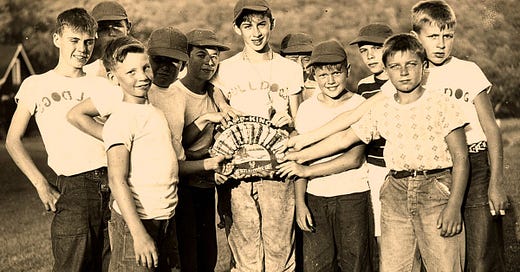I’m a huge psych nerd. I have three degrees in psychology, and my graduate work focus was in social and developmental psych. Some psych experiments are just SO COOL to talk about, since they give us such amazing insights into how people think and why they do the things they do. I can “geek out” about them at length.
The Robbers Cave Experiment: In 1954, 22 middle-school boys at a summer camp were split into two groups. The groups lived in separate cabins and did separate activities (like swimming, hiking, mealtimes, etc.) just with their own group.
Phase 1 of the study looked at how these groups bonded—their “in-group” cohesion. It only took about a week for each group of boys to become a team, to develop a sense of in-group identity. Team-building in a positive environment can happen effectively and quickly.
Near the end of this week, though, these two groups started to become aware of each other. The boys initially didn’t know there was a second cabin of middle-school boys in the same camping area, but when they became aware, they saw the other group as intruders or outsiders. This is the classic us-versus-them mindset.
In Phase 2, the two groups were put into direct competition—a series of games like tug-of-war—and the winning team received a trophy, as well as medals and knives for each of them. This was intentionally created as a zero-sum scenario.
The situation devolved into what some have called “a real-life Lord of the Flies.” Name-calling escalated in property destruction, raids on each others’ cabins, and theft of treasured objects (including those medals and knives). One group then armed themselves with weapons made by putting rocks into tube socks (the staff took them away before they could use them), and as the two groups turned out en masse to physically attack each other, the staff finally put an end to the second phase.
Phase 3 is why I bring this up in a leadership post—how the heck is a leader supposed to get people out of their in-groups—out of their cliques and silos—and get them to interact positively with each other? Just putting the two groups into contact (shared meals and outings) didn’t create a new, single in-group. It basically just gave the boys the opportunity to insult each other on a regular schedule.
The two groups in the Robbers Cave Experiment finally were able to set aside their differences and work together when they had to solve a common problem. The staff secretly sabotaged the water supply, and the boys had to work together to figure out how to fix it. Additional shared-problem/shared-benefit-from-a-solution tasks (e.g., getting their shared food truck unstuck on a camping trip) gradually built the cohesion—it wasn’t a one-and-done fix, but a series over time. The boys eventually learned to work together, and the us-versus-them dynamic faded away, replaced by a stronger sense that “we’re all in this together” that led to more positive interactions.
If you have a clique or a silo within your team, don’t let that us-versus-them dynamic grow. A healthy partnership or work-group works well together toward a goal that benefits the whole team (and the company, and the client, etc.). If you have a few people on your team who work collaboratively with each other to accomplish shared tasks, that’s good—keep that stuff up! That’s not a problem. The negative side of in-group cohesion—the stuff I’m warning about with this post—occurs when the in-group members define themselves in opposition to the out-group, which leads to unhealthy competition, scapegoating, eroding trust and communication, reduced productivity because of all the CYA activities, and decreased morale and retention—people leave because they don’t want to deal with all the drama.
As leaders, we should not let this fester. We can proactively address these issues by changing up the work groups, breaking up the unhealthy cliques, and communicating the “we are all in this together—we are all on the same team” through our consistent words and actions.
For a great summary of this experiment: https://blogs.scientificamerican.com/literally-psyched/revisiting-the-robbers-cave-the-easy-spontaneity-of-intergroup-conflict/
(image source: https://www.theguardian.com/science/2018/apr/16/a-real-life-lord-of-the-flies-the-troubling-legacy-of-the-robbers-cave-experiment )



